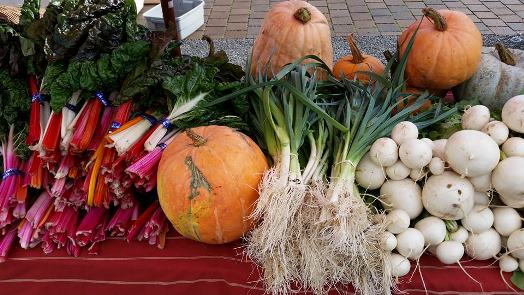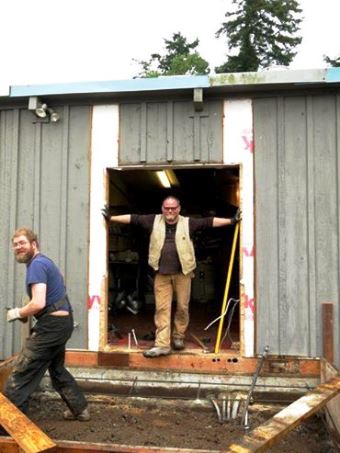“Something good is happening here in our own neighborhoods that we can support right now.”
— by Margie Doyle —
John Steward, owner of Maple Rock Farm, works every day with his head and his hands. For he knows that to really share his passion for good food and dining, his efforts have to be sustainable — he has to be a good businessman as well as a good farmer.
“Evolution from Day One, including the restaurant” has been Maple Rock Farm’s history since 2000, whether branching out to Community Supported Agriculture (CSA) memberships, to Farmers Markets, or to restaurants, including his own Hogstone Pizza in Eastsound.
“It has all evolved out of what we were doing, focused around the farm and our love of food and making people happy with food,” Steward says.
He’s seen a renewed commitment to farming, tinged with not a little romance about the work, and he’s been continuously working towards making local agricultural a real business. He maintains an active Facebook page, with references to the latest developments in agriculture and shout-outs for help on specific chores, such as compost spreading or garlic planting.
He says, “Good things are happening at Maple Rock Farm. We’re still harvesting, and planning, planting and getting set for an awesome year. We are now accepting new and renewal CSA share memberships — budget friendly plans for year round goodness. Get local, get fresh!”
Behind the dirt and the produce and the markets are activities such as crop planning, projections, seed ordering, sowing in greenhouses,fund-raising, marketing, budgets, sales, and harvesting.
Maple Rock Farm produce is sold on the island at the Farmers Markets at the Village Green, at a stand at Hogstone in town and, in the shoulder seasons, at the Odd Fellows Hall. While people like to go to the Farmers Markets and they are a great tourism draw, that’s only one part of the farm business picture.
More crucial to the success of local farm businesses, Steward says, are the investment-purchase of Community Supported Agriculture memberships (CSAs) an advance payment plan for purchasing local crops.
They are typically structured as an annual “pre-payment” during the planting and growing season for produce delivered later in the year. By purchasing a CSA, customers invest in their local farms before the crop has even been planted. This investment expresses support for the farmer’s endeavor and provides income at a time when costs are high and sales are low.
Maple Rock Farm has further developed the CSA concept.
“CSA the Maple Rock way
“We take the untraditional approach to CSA, forgoing the model of set harvest boxes. Our members choose what and how much they want from our farm stand at Hogstone throughout the week, and we keep track of their account like a tab.“This pre-pay credit system allows members to get an abundance when they need it, and to go on vacation without feeling like they’ve missed out on a week’s share. We keep track of the accounting and members enjoy a cashless transaction with each visit.” (from www.maplerockfarm.com )
Steward says, “As consumers, we all have a choice. The easiest way to make a difference and connect with a local food source is to become a CSA member with a local farm.”
Steward says that locals, including restauranteurs, are “our bread and butter,” especially restaurants who make the conscious effort to purchase locally-grown. With his partner Jay Blackinton, Steward opened Hogstone Pizzas in 2014. The menu’s expanded to include “found things” from the sea, forest and farm.
Providence Cicero, restaurant critic for the Seattle Times, wrote last year, “The best pizza in the state can be found on Orcas Island at Hogstone’s Wood Oven; its supple, faintly crackling crust topped with whatever farmers-by-day, chefs-by-night John Steward and Jay Blackinton have lately harvested from the surrounding fields and waters. ”
Steward credits Blackinton with the success of the restaurant, saying simply, “I’ve always been a gardener.”
Back to business, Steward says, “There’s a lot in farming that people don’t see; it’s not what people’s first notion would lead them to believe. It’s very entrepreneurial — in sales and marketing, in business planning. I like figuring it out, ever month you know you’ve got to make it. A sustainable farm has to be financially sound. I’m not looking to hit a home run, but to grow and produce as best we can.
“And fixing things — it’s non-stop, working, improving equipment, hiring labor. The big thing this year is intern labor. We’re trying to break out, hiring local, hourly, wage-type people, rather than interns. I love what I do — to grow food for people and eat well myself; to pass along the feeling; to feel good about what we do.”
Steward has found the tricky part is to match that passion with financial stability. He says, “There’s strength in numbers and if people want to make a difference, it’s pretty simple: spend $200 for a CSA — change your world and someone else’s.”
**If you are reading theOrcasonian for free, thank your fellow islanders. If you would like to support theOrcasonian CLICK HERE to set your modestly-priced, voluntary subscription. Otherwise, no worries; we’re happy to share with you.**










HI, I JUST WANTED TO SAY THAT I CAN’T WAIT TO GO BACK TO YOUR PLACE AND TRY YOUR PIZZA, WE WERE THERE LAST APRIL AND SPEND A WEEK AT ORCAS, JUST SO YOU KNOW WE ARE PLANING TO MOVE TO ORCAS IN TWO YEARS OR SO, MEAN WHILE WE’LL SEE YOU BY THE FIRST WEEK OF JULY SINCE WE ARE DRIVING UP FROM SOUTHERN CALIFORNIA WITH OUR VINTAGE CAMPER.
THANK YOU FOR YOUR FOOD